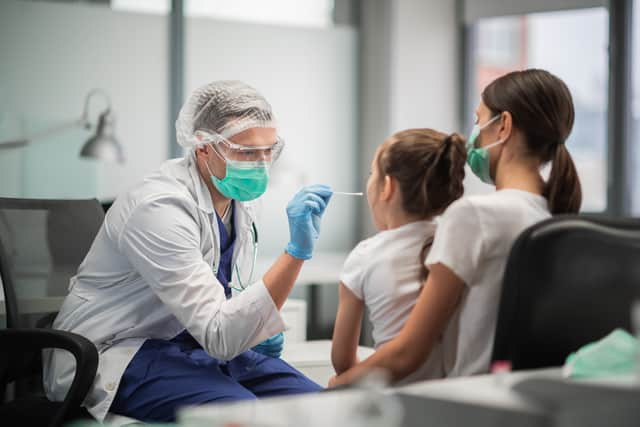Do children need to self-isolate? The latest guidance for kids who test positive or are close contacts
This article contains affiliate links. We may earn a small commission on items purchased through this article, but that does not affect our editorial judgement.
and live on Freeview channel 276
Schools in England will return to tighter Covid-19 measures when they return this week, amid concern over the spread of the Omicron variant.
The Government has announced that all secondary school children in England should wear masks in the classroom again, and there will be twice-weekly testing of pupils.
Advertisement
Hide AdAdvertisement
Hide AdEducation Secretary Nadhim Zahawi has also told headteachers to consider merging classes or sending groups of children home if the number of staff off work due to Covid reaches critical levels.
With ongoing concern over the record Covid-19 case numbers across the UK, many parents are concerned over what to do if their child tests positive.
Here is everything you need to know about the latest official guidance.


Do children need to self-isolate if they test positive?
The current self-isolation guidance for adults in England also applies to children and young people “who usually attend an education or childcare setting”, according to the Government website.
Advertisement
Hide AdAdvertisement
Hide AdThis means that if a school-age child tests positive for Covid-19 they need to self-isolate.
The self isolation period in England has been cut from 10 days down to seven, meaning those who have the virus can now take two lateral flow tests 24 hours apart on day six and seven of their isolation period. If the result comes back negative, the quarantine period can end.
The isolation period is still 10 days for those who do not live in England.
Do children need to self-isolate if they share a household with someone who has Covid-19?
The guidance states that those aged under 18 years and 6 months who live in the same household as someone with Covid-19 do not have to self-isolate and “should continue to attend the [education] setting as normal”.
Advertisement
Hide AdAdvertisement
Hide AdHowever, they are strongly advised to “take a lateral flow test every day for seven days, and to self-isolate if any of these test results is positive”.
Do children under 5 need to self-isolate?
Following confusion around the guidance for under-fives, the government has confirmed that under-fives who live in the same household as someone who has tested positive for Covid-19 should still take a PCR test – but there is no requirement to self-isolate while awaiting test results.
The guidance states: "Regular LFD (lateral flow device) tests are not recommended for children aged under five. If they live with someone who has Covid-19 they are not legally required to self-isolate but you should limit their contact with anyone who is at higher risk of severe illness if infected with Covid-19 and arrange for them to take a PCR test as soon as possible."
What are the general rules on self-isolation in the four home nations?
Anyone whose lateral flow test comes back positive, or who develops Covid symptoms, should self-isolate and take a PCR test to verify the result.
Advertisement
Hide AdAdvertisement
Hide AdThose who are double jabbed and identified as a contact of someone with Covid-19 do not need to self isolate, but instead should take a daily lateral flow test.
While the isolation period in England has been reduced to seven days, this is not the case in Scotland, Wales and Northern Ireland.
In Scotland, Wales and Northern Ireland the period starts immediately from when your symptoms started, or from when a positive lateral flow or PCR test was taken if you do not have any symptoms - whichever test was taken first.
From this point, the isolation then includes the next 10 full days. This time period also applies to unvaccinated people in England.
Am I entitled to compensation if my child has to self-isolate?
Advertisement
Hide AdAdvertisement
Hide AdIf you are the parent or guardian of a child who has to self-isolate, you may be entitled to a payment of £500 from your local authority under the Test and Trace Support Payment scheme.
The payment is to help support those on low incomes, or claiming benefits, who are left unable to work due to childcare.
The payment is only available to people in England and can be claimed via the government website.
Parents must submit the claim within 42 days of their child’s first day of self-isolation.
Advertisement
Hide AdAdvertisement
Hide AdThose who do not live in England may be eligible to claim for the self-isolation support scheme in Wales, the self-isolation support grant in Scotland or support in Northern Ireland.
A message from the editor:
Thank you for reading. NationalWorld is a new national news brand, produced by a team of journalists, editors, video producers and designers who live and work across the UK. Find out more about who’s who in the team, and our editorial values. We want to start a community among our readers, so please follow us on Facebook, Twitter and Instagram, and keep the conversation going. You can also sign up to our email newsletters and get a curated selection of our best reads to your inbox every day.
Comment Guidelines
National World encourages reader discussion on our stories. User feedback, insights and back-and-forth exchanges add a rich layer of context to reporting. Please review our Community Guidelines before commenting.